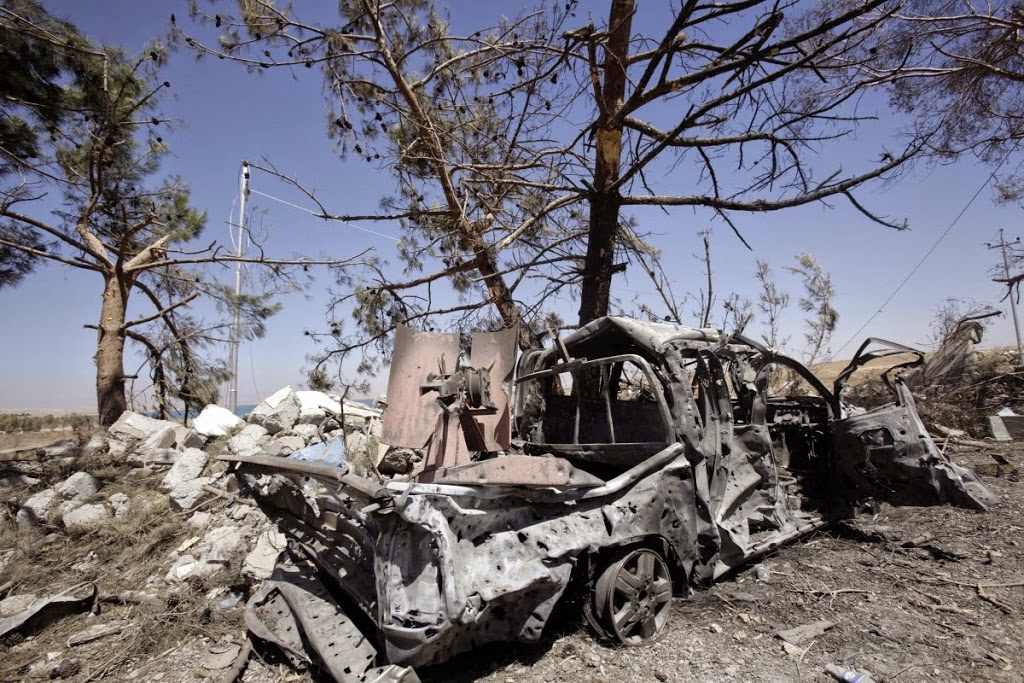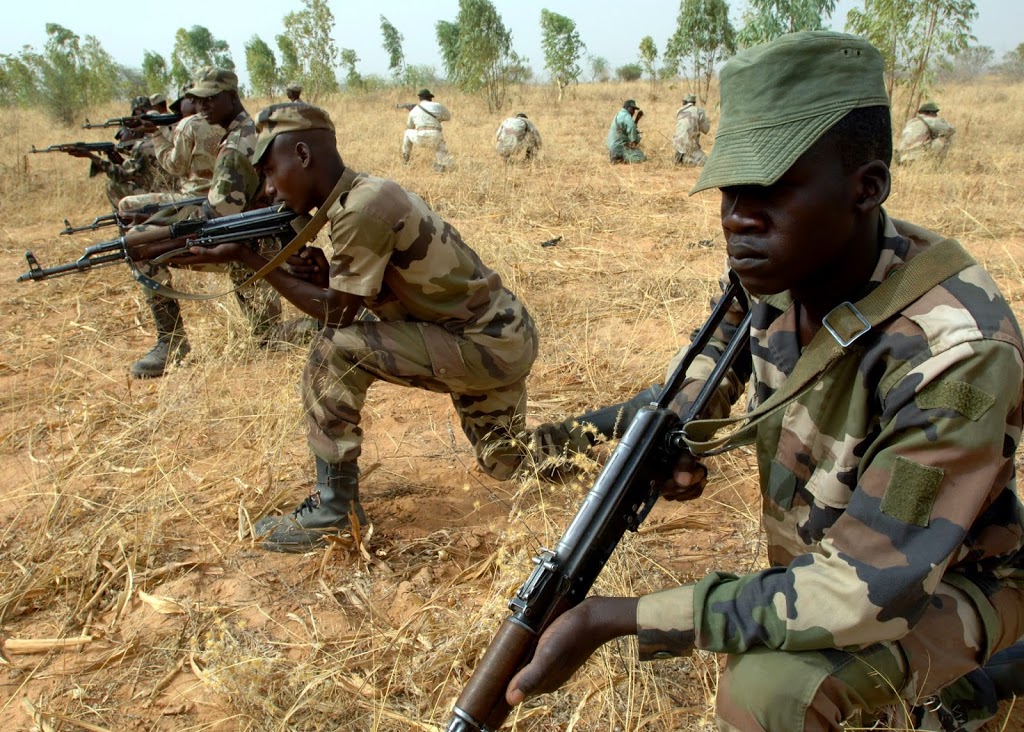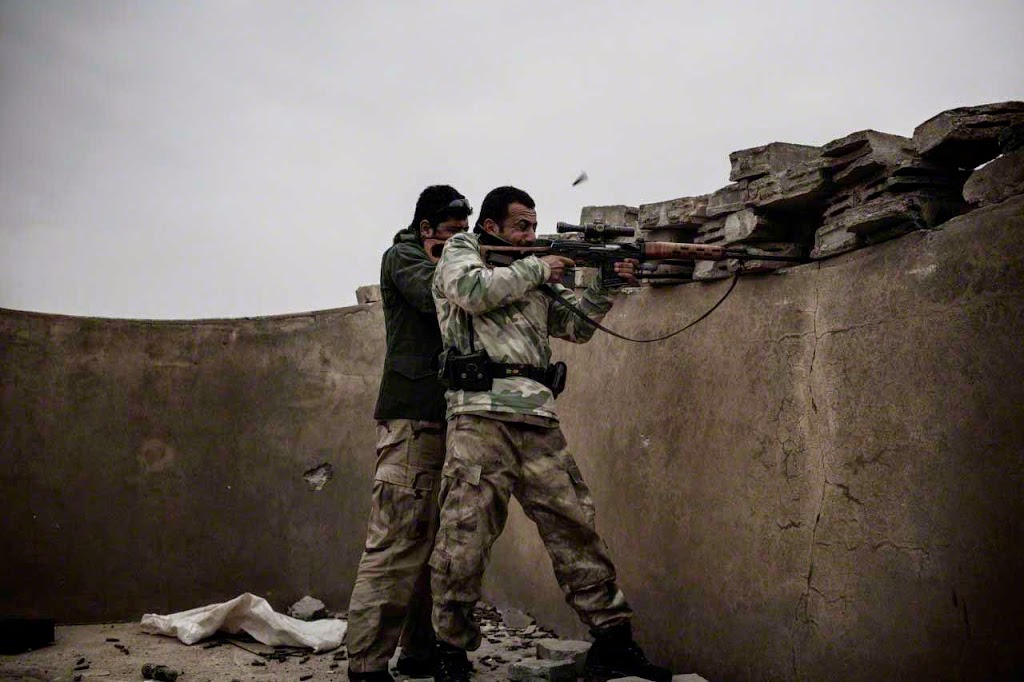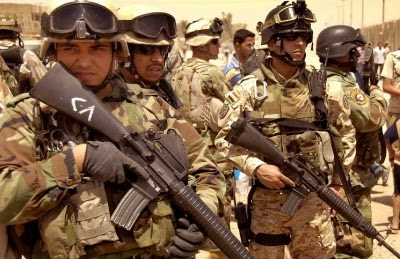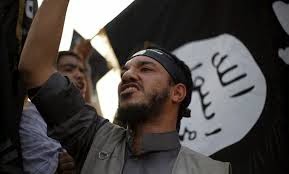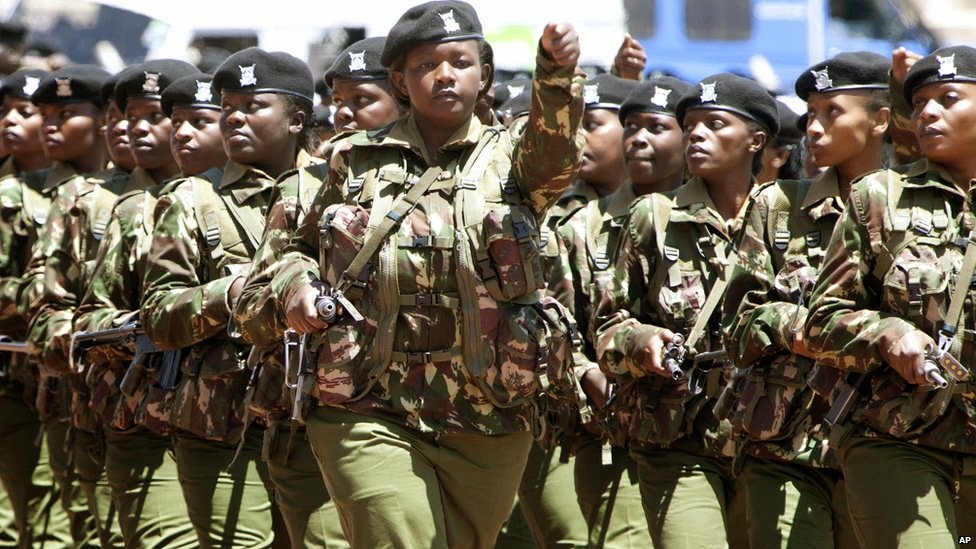A suspected US drone strike on a car in Yemen killed three men believed to be Al Qaida militants on Saturday, local residents said, showing no let up in the hits despite the resignation of the president who backed the programme.
Chad Army kills 120 Boko Haram islamists militants in Cameroon
Chadian forces have killed 120 militants from Boko Haram in a battle in the north of neighbouring Cameroon that began when the insurgents attacked its troops, the army said in a statement on Saturday, adding that three of its soldiers were killed.
Boko Haram has recently launched cross-border attacks from Nigeria into Cameroon and Chad as part of its five-year drive for an Islamist state in the northeast of Nigeria.
Chad and Cameroon have stepped up troop deployments to fight the militants and on Saturday Chad’s army said it bombarded Boko Haram militants.
The African Union (AU) has authorised a force of 7 500 troops from Nigeria, Chad, Cameroon, Niger and Benin to fight the militants and the nations will meet in the Cameroon capital next week to decide on its command structure, Ghana President John Mahama told journalists on Saturday.
“When they meet in Yaounde the rules of engagement will be agreed by the nations constituting the force. It will allow them to move across borders because Boko Haram does not recognise borders,” Mahama said on his return from an AU summit.
Chad has a reputation as one of the region’s best militaries and it helped French forces drive al Qaeda-linked Islamists from northern Mali in 2013. But previous efforts to create a regional force to fight the militants have faltered.
Source: sabc.co.za
15 Peshmerga, trapped in a house surrounded, fought hundreds of Islamic State militants for over 24 hours
A Peshmerga source explained the situation to BasNews: “Following the IS attack in western Kirkuk early on Friday morning, they captured Mullah Abdullah. Fifteen Peshmerga near the village found themselves surrounded by insurgents.”
After the village and area was retaken by Peshmerga forces on Saturday, they found that four of the Kurdish fighters had been killed in the battle.
Iraqi forces kill 32 ISIS militants southern Anbar
Al-Anbar (IraqiNews.com) On Saturday, Iraqi Ministry of Defense announced, that 30 elements of the ISIS group have been killed during fierce clashes with the Iraqi forces in areas of southern Anbar.
The ministry said in a statement obtained by IraqiNews, “Iraqi troops of the Army’s Eighth Brigade have managed to repel an intensive attack by the ISIS group militants on the area of al-Fallahat,” pointing out that, “The fierce clashes between the two sides resulted in killing 32 terrorists, including four snipers and seven suicide bombers within the ISIS group.”
Drone strike kills top Al-Shabaab leader in Somalia, almost 40 islamists terrorists killed
A top leader of the Qaeda-linked Al-Shabaab movement and some movement members were killed on Saturday in a strike believed to be carried out by a U.S. drone, a Somali official has said.
Ahmed Adan said the strike targeted a convoy of Al-Shabaab top leaders near Dinsoor, a town in the southwestern Bay region of Somalia.
“I have confirmation from the ground that several Al-Shabaab militants and a top leader have been killed in the airstrike,” Adan, a Bay region official, told The Anadolu Agency.
“They were in several vehicles heading to a training camp, not far from Dinsoor,” he added.
The name of the Al-Shabaab leader targeted as part of the convoy was not immediately known.
Adan said, however, that the training camp and two Dinsoor houses were also targeted by the strike.
Dinsoor is one of the few remaining urban centers still controlled by Al-Shabaab, which has been battling the government of Mogadishu for several years now.
On Sept. 2, 2014, a U.S. drone attack killed Al-Shabaab leader Ahmed Godane, and as the year ended, Al-Shabaab’s intelligence chief, Abdi Tahliil, was also killed by another drone attack.
Source: aa.com.tr
Breaking: Maiduguri in this moment is under attack by islamists Boko Haram
curfew had to be imposed.
Sisi says Egypt faces long fight to defeat Sinai islamists militants
Egypt’s President Abdel Fatah Al Sisi told his nation to prepare for a long fight to defeat extremists on Saturday following a wave of attacks on security forces in the Sinai Peninsula.
Sisi made his televised address as military commanders announced plans to forge a unified command for all armed forces in Sinai.
“We will not leave Sinai for the terrorists,” Sisi said.
Extremists targeting Egyptian military positions killed 31 security force members in a sophisticated and multi-pronged set of attacks on Thursday night.
A Daesh-linked group in Egypt claimed responsibility, but Sisi laid the blame on the Muslim Brotherhood.
The Egyptian government has long said it is fighting a war on terror. But it has not been able to stem a daily stream of militant attacks despite more than a year of massive military operations in northern Sinai.
Two children, aged six and six months, were killed on Friday in an explosion that the army blamed on the militants.
A military official said the new “unified command” will mean joining the army units in North and South Sinai into a single force. He said this will involve setting up a new headquarters in Al Arish to administer military operations against terrorism.
Thursday’s assault was the second major deadly attack on Egyptian security forces in Sinai in the last 6 months. 31 troops were killed in an attack last October.
Attacks on Egyptian security forces dramatically escalated after the military — led by Sisi — ousted Mohammed Mursi in July 2013.
Source: khaleejtimes
Islamic State threat in Libya can only grow
Islamic State’s franchise in Libya has heightened security concerns in Malta. The experts agree that the power vacuum in Tripoli offers ISIS fertile ground.
Prime Minister Joseph Muscat has sounded a stark warning on the prospect that Libya is now teetering along a familiar route for all failed states.
With authority now fragmented amongst militia-run provinces, an anti-Islamist military effort by renegade general Khalifa Haftar and his Operation Dignity, the Misrata-run Libya Dawn that took Tripoli, and Abdullah Al Thinni’s exiled government in Tobruk, the big question is whether Islamic State’s franchise in the Mediterranean can have spill-over effects.
Muscat told MPs this week that migratory flows and an energy crisis would be among the first effects of a Libyan collapse, and that a United Nations peacekeeping force should be on the ready to keep the country on track to rebuild itself.
The suicide bombers that attacked the Maltese-Libyan owned Corinthia Hotel in Tripoli last week brought the reality of Islamic State closer to home.
It was already known that ISIS adherents had proclaimed Derna as part of the caliphate, but the conflagration of interests inside the Corinthia’s lobby and its bloody aftermath were evident to experts like Mohammed Eljarh. Early on in the day he spotted the tweets calling the Corinthia attack an operation to avenge the death of al Qaeda suspect Nazih al-Ruqai, also known as Abu Anas al-Libi, in a US hospital in January. Libi, an alleged former al Qaeda operative, was snatched by the CIA in 2013 in Libya, for his alleged role in the 1998 US Embassy bombings in Kenya and Tanzania. Those two bombings killed 224 people, including 12 Americans, and injured thousands more.
Back in Malta, the embassy attaché in Attard, Hussin Misrati, who represents the Tripoli ‘government’ run by pretender Omar al Hassi, is claiming that the attack was an attempt on their leader – who sometimes runs business from the Corinthia – and not an ISIS operation.
Misrati is in a state of denial. As Eljarh points out in his update for Foreign Policy magazine on the Corinthia attack, the Islamic State has become more visible in western and southern Libya in recent weeks after months of fierce fighting in the eastern city of Benghazi.
“The attack in Tripoli underlines the huge threat from extremist groups throughout Libya… It’s likely that Islamic State fighters will press ahead with their attacks against targets in Tripoli and other communities in the west, including the relatively safe city of Misrata, as they seek to broaden their presence, following the example set by the rapid territorial expansion of the Islamic State in Syria and Iraq last year.”
Hassi’s government has blamed Gaddafi loyalists working for Haftar.
“The state of denial by Hassi and his allies has its roots in their belief that acknowledging the existence of groups like the Islamic State would reinforce the position of the army and Haftar. They see Haftar as their No. 1 enemy in Libya, and they have correspondingly clung to the notion that the enemy of their enemy is their friend. Now, however, the Islamic State has sent a clear message that it is the friend of no one, apart from those who pledge unconditional allegiance to it,” Eljarh writes.
As peace talks in Geneva continue under the auspices of the United Nations, the threat that Islamic State could plant its roots in the fertile land of internecine conflict risks becoming a reality in divided Libya.
Avenging Abu Anas
The death of Libi at the hands of his US captors illustrates how the war on terrorism waged by intelligence services in covert operations, serves as a background to the radicalisation of fighters in countries like Libya.
There is no doubt that Libi, a computer expert, was a mastermind in the US embassy bombings with a past in fighting the Soviets in Afghanistan and, according to a Moroccan witness, close to Osama Bin Laden. His family is believed to have been granted political asylum in the UK, but after a raid on his house in Manchester in 2000, ostensibly on intelligence tip-offs, he relocated to Iran. There he was arrested, and only allowed to return to Libya in 2011.
Nazih Abdul-Hamed al-Ruqai, known by his alias Abu Anas al-Libi, was taken by US Delta Force marines in a dramatic operation in the Libyan capital in October 2013. Suspected of being a senior al Qaeda member, he was accused of involvement in the 1998 bombings of two American embassies in Africa and was on the FBI’s most wanted militants list.
The CCTV footage of his capture shows masked men brandishing handguns leaping out from a white Mercedes van as Libi returned in his car at 6:30am from morning prayers. Three cars blocked the street, then came a van with tinted windows. The van pulled up and without a shot being fired, Libi was swooped away for rendition.
It was an important coup for the Americans, celebrated by the media there, while back in Libya, the Zeidan government condemned the kidnapping.
Libi was indicted in Manhattan on charges of conspiring with Bin Laden and in the 1998 bombings of the US embassies in Nairobi, Kenya, and Dar es Salaam, Tanzania.
He was described as an Al Qaeda computer expert who conducted surveillance of the embassy in Nairobi. He allegedly authored a terrorism manual recommending “blasting and destroying the embassies and attacking vital economic centres”.
Early in January, Libi died at the age of 50 in a New York hospital of complications from liver surgery as he was waiting to stand trial. His son Abdullah’s raucous display of outrage, surrounded by Islamic State flags, on the return of his father’s body could have portended the attack on the Corinthia Hotel in Tripoli, which houses diplomats and security contractors.
“Let Obama know that our appointment with him will be in front of Allah,” Abdullah al Ruqai is seen telling journalists angrily, in a YouTube video, on his father’s death. “I won’t forgive anyone who participated in the kidnapping of my father even if it was by mere words.”
From rendition to radicalisation
An assessment by the UK security service MI5 has established that a secret UK-Libyan rendition programme in which two Libyan opposition leaders were kidnapped and flown to Tripoli, along with their families, had the effect of strengthening Al Qaeda.
The Guardian newspaper wrote that prior to their kidnap, Abdel Hakim Belhaj and Sami al-Saadi had ensured that their organisation, the Libyan Islamic Fighting Group (LIFG), focused on the overthrow of Colonel Gaddafi.
But when the UK’s intelligence service MI6 seized them in Thailand and Hong Kong in March 2004 – and “rendered” to Tripoli along with Belhaj’s pregnant wife and Saadi’s wife and four children – their places at the head of the LIFG were taken by others who wanted to bring the group closer to Al Qaeda.
The papers recovered during the Libyan revolution show that Britain’s intelligence agencies engaged in joint operations with Gaddafi’s government.
In 2006, Libyan agents worked alongside MI5 on UK soil to allegedly intimidate a number of Gaddafi opponents granted asylum in the UK.
In a letter, Tony Blair wrote to Gaddafi in April 2007, addressed “Dear Mu’ammar”. Blair expressed his regret that the British government had failed in its attempts to have a number of Gaddafi’s opponents deported from the UK. It turned out that MI5 was seeking to disrupt the activities of anti-Gaddafi activists.
Belhaj and Saadi both say they were beaten, whipped, subjected to electric shocks, deprived of sleep and threatened while being held at Tajoura prison outside Tripoli.
Caliphate in the Med
Radical Islam is not new to Libya. In the 1990s the main armed resistance to Gaddafi was in fact the Libyan Islamic Fighting Group, whom the dictator crushed after a 10-year war in the Green mountains.
Years later, the main origin of the fighters that later would find themselves also fighting American forces inside Iraq, hailed from the town Derna.
When the 2011 revolution saw the Islamists return home, after Gaddafi’s death the big winners were the non-jihadist Muslim Brotherhood, whose Justice and Construction Party scraped together a fragile coalition after the first post-revolution elections in 2012.
Jihadism expert Aaron Y. Zelin was amongst the first to bring out the news of the rising Islamic State flag in Derna.
Majlis Shura Shabab al-Islam, based in Derna, proclaimed its allegiance to the Caliph (‘baya’), and since then Islamic State is believed to be operating in Benghazi, Sirte, and Tripoli, creating the self-styled Wilayat al-Barqah in the east, Wilayat al-Tarabulus in the west, and Wilayat al-Fizan in the south.
Zelin says ISIS’s “wilayat” strategy differs in significant ways from Al Qaeda’s “franchise” strategy.
“The key difference is that Al Qaeda wanted its franchises to attack Western countries so that they stop supporting ‘apostate Arab regimes, which without the support of Western countries would then be ripe for the taking… On the other hand, the Islamic State’s main priority is building out its caliphate, fighting locally, instituting limited governance and conducting outreach.”
Added to this is Islamic State’s social media strategy: the Corinthia Tripoli attack was live-blogged by ISIS supporters on Twitter, who declared the operation “ongoing”, in the name of the “martyred” Abu Anas, and then tweeted the images of the suicide bombers.
“This accomplishes more, even if it appears that the Islamic State is doing more than it actually is, in comparison with al-Qaeda’s practice of waiting for a successful external operation to succeed and then claiming responsibility after the fact,” Zelin says.
“Libya has the highest likelihood of success since there is no state, though there are limitations too since there is a multi-polar devolution of a variety of armed actors… as of now, the Islamic State has indeed set itself up on a limited base in the Sinai and has established a growing movement in Libya more than two months following the announcement of its expansion.”
Source: maltatoday
Kurdistan Region PM Barzani: war against Islamic State will take years
Kurdistan Region Prime Minister Nechirvan Barzani warned that the war against Islamic State is going to last years if current policy continues.
Nigeria Army relocates female soldiers from Maiduguri in anticipation of Boko Haram attack
Following recent intelligence indicating that Boko Haram militants were strategizing on a fierce offensive to capture Maiduguri before the February 14 elections, the army moved more than 70 female soldiers last week.
Highly reliable security sources have told SaharaReporters that Nigerian military authorities are moving female soldiers based in various army formations in Maiduguri and other parts of Borno State to Abuja as the army anticipates a massive attack on Maiduguri, the Borno State capital, by terrorists belonging to Islamist group, Boko Haram.
The sources said there was heightened apprehension about an impending attack, hence the decision to reassign female soldiers to Nigeria’s capital.
The military action also stemmed from the death of five female soldiers and the abduction of another four by Boko Haram militants when they attacked a military base in Baga a few weeks ago.
Following recent intelligence indicating that Boko Haram militants were strategizing on a fierce offensive to capture Maiduguri before the February 14 elections, the army moved more than 70 female soldiers last week. One of our sources revealed that 146 more female soldiers had been moved to Maiduguri airport, where they are awaiting airlift to Abuja. The source said that all the female soldiers were supposed to have left by 10 a.m. on Thursday, but added that the military did not have a large enough aircraft to take their entire luggage.
The security sources also told SaharaReporters that Maimalari Barracks, home to the 7th Division of the Nigerian Army, is the only military base left standing in Borno State. Maimalari was described as the only military formation capable of withstanding a major attack from Boko Haram militants.
One source said that Nigerian military intelligence had received information that Islamist militants were regrouping in areas around Maiduguri in preparation for a major offensive against the city. The Islamist fighters’ attempt to take over the state capital last week was foiled, with Nigerian troops and civilian vigilante members collaborating to kill more than 100 terrorists.
However, the militants successfully overran Monguno Barrack, killing and injuring many soldiers. One military source revealed that military authorities have so far been able to account for approximately 1,000 soldiers out of the 1,400 soldiers who were stationed in the Monguno Barracks. Most of the soldiers had reported to Maimalari Barracks in Maiduguri, but were locked out for several days by military authorities.
An officer in Maiduguri told SaharaReporters that the troops in the state capital were equal to the task of repelling any attacks by Boko Haram, but a few residents told our correspondent that they were skeptical of such confidence. One resident wondered why the Nigerian military had not adopted an offensive strategy against Boko Haram insurgents, instead of only defending when the Islamist fighters initiate an attack.
Asked why Nigerian soldiers often flee from advancing columns of Boko Haram attacks when Chadian and Cameroonian troops are recording major successes against the insurgents, a Nigerian military source blamed it on the inadequate weaponry as well as poor motivation on the part of Nigerian soldiers. He stated that battle-weary Nigerian soldiers keep hearing reports of their commanders in Abuja who have acquired huge wealth from the burgeoning defense budget. “Even to pay these soldiers their allowance or to buy them good helmets is a problem because of this corruption that is well known,” the officer said.
A source claimed that Chadian soldiers had chased off Boko Haram militants from Gamboru-Ngala, while troops from Niger Republic reportedly pushed out the militants from Malafatori on the Nigerian-Niger border. There were also reports that Cameroonian military forces had pushed Boko Haram from Kirawa and Ashigashiwa on the eastern flank.
Source: saharareporters
- « Previous Page
- 1
- …
- 192
- 193
- 194
- 195
- 196
- …
- 268
- Next Page »
